Vladimir Vladimirovich Putin; Russian: born 7 October 1952 is a Russian politician and former intelligence officer. He is a Russian politician. As of 7 May 2012, he’s the President of Russia, having been re-elected on 2018 presidential election, getting 76% of the votes. read Putin: Architect of Modern Russia and Global Power Strategist.
Previously, he served as President of the Russian Federation from 2000–2008 and Prime Minister of Russia from 1999–2000 and from 2008–2012. He was also the chair of the United Russia party of Russia during his period of being the Prime Minister.
Putin spent 16 years as an officer in the K.G.B., the Soviet intelligence agency, where he rose to the rank of lieutenant colonel. He entered politics after retiring in 1991 in his native city of Saint Petersburg. He joined President Boris Yeltsin ‘s administration in Moscow in 1996, and he became Acting President of Russia on Dec. 31, 1999 when Yeltsin announced his surprise resignation. He followed that by winning presidential elections in 2000 and 2004.
And he was ruled out from running for a third straight presidential election in 2008 because of term limits imposed by the Russian Constitution. Medvedev, however, won the presidential election in 2008, with Putin as prime minister.
A change to the law in September 2011 extended the presidential term from four years to six years, and Putin announced he would seek a third term in 2012, triggering mass protests in many Russian cities.
He was elected in March 2012 and is still serving a six-year term. He was elected to a second term in the 2018 presidential election, winning 76 percent of the vote.
In Putin’s first term as Prime Minister and President (1999 – 2008), real incomes rose 2.5 times, real wages tripled; unemployment and poverty were halved and self-rated life satisfaction among Russians increased significantly.
Putin’s first presidential term is described as a period of economic growth: For eight years in a row, the Russian economy increased, with purchasing power parity growing by 72% and nominal GDP rising sixfold.
Early life of the father of Modern Russia
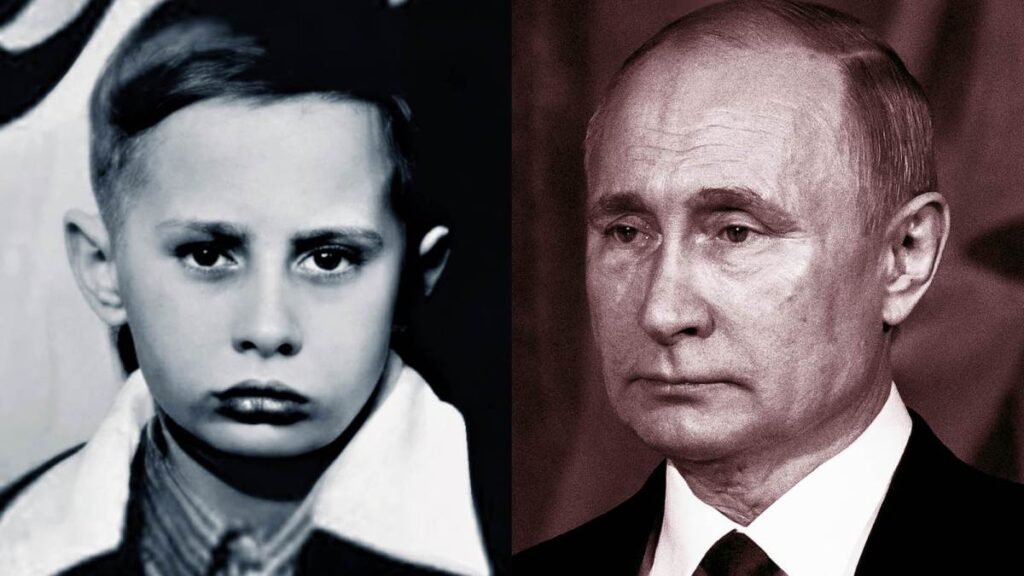
Born on 7 October 1952 in Leningrad (now Saint Petersburg, Russia), Russian Republic, Soviet Union His father Russian Vladimir Spiridonovich Putin (1911–1999) and his mother Maria Ivanovna Shelomova( (1911–1998). His mother was a factory worker and his father was a sailor in the Soviet Navy.
His father served in the submarine fleet in the 1930s and then joined the ambush squad during World War II. He worked as a foreman in a factory after the war. Vladimir was the third child born to his parents, and he lost both older brothers in childhood. In 1975, Putin graduated from Leningrad State University, after which he began working for the KGB, where he remained until 1991.
Life of Igor Sechin, Architect and Global Power Strategist Putin
Putin graduated from Leningrad State University in 1975 and then began working with the KGB . In his brief posting there with the K.G.B., he was assigned to monitor foreigners and consular officials in Leningrad.
Saint Petersburg administrative work (1990–1996)
Putin became an adviser to Leningrad Mayor Anatoly Sobchak in 1990. That is where he launched his political career. He was the head of the Foreign Relations Committee of the St. Petersburg Mayor’s Office from 28 June 1991 to February 1997, where he worked on promoting international relations and attracting foreign investment. Putin also registered business enterprises with this committee.
In 1994–96, he was in various political and governmental functions in Saint Petersburg.
Putin as head of the Federal Security Service (FSB), 1 January 1998
In 1996, with Mayor Anatoly Sobchak defeated in the election, Sobchak was summoned to Moscow and went on to work in President Boris Yeltsin’s administration office, where he served until March 1997.
On March 26, 1997, Boris Yeltsin, the president of Russia, appointed Vladimir Putin as Deputy Head of the Presidential Administration, and he served until May 1998. He also served as the head of the Main Control Directorate of the Presidential Property Management Department until June 1998. On 25 May 1998, he was appointed head of the Federal Security Service, FSB (thus one of the successor agencies to the KGB). On October 1, 1998 he became a permanent member of the Security Council of the Russian Federation and on March 29, 1999 Secretary of the Council.
Prime Minister’s post (1999)
How A 1999 Russian Bombing Gave Putin A Path To Power
Vladimir Putin was appointed as one of three First Deputy Prime Ministers by President Boris Yeltsin on 9 August 1999 and later that day Acting Prime Minister of the Russian Federal Government. President Yeltsin introduced Putin as his successor on television. On the same day, Putin decided to run for president.
On August 16, Putin’s appointment as Prime Minister was approved by the State Duma with 233 votes for, more than the 226 for simple majority. He was Russia’s fifth Prime Minister in eighteen months. At first viewed as a Yeltsin loyalist, unlike Boris Yeltsin’s other Prime Ministers, Putin appointed no ministers of his own. The print cabinet belonged to the presidential office.
At the time, Chechnya was battling for independence from Russia. Russian forces then seized control of Chechnya. His image as a strongman of law and order was boosted by a tough stance in Chechnya, and his popularity soared.
He was not actually a member, which made this proclamation a matter of political convenience, but Putin made clear his support of the newly founded Unity Party, which had come in second place in Duma elections in Dec 1999, with 23.3 % of the popular vote. The party subsequently backed him.
Acting President (1999-2000)
On December 31, 1999, President Yeltsin resigned, and in accordance with the Russian Constitution, Putin took office as the acting President of Russia.
On the same day he signed his first decree, guaranteeing that “corruption charges against the outgoing president and his relatives will not be pursued”. On February 12, 2001, this same federal law was signed by Putin himself on the basis of that decree, thus replacing the decree of 1999.
Within three months of Yeltsin’s resignation, a presidential election was held that Putin won with 52.94 percent of the vote.
First term as President (2000–2004)
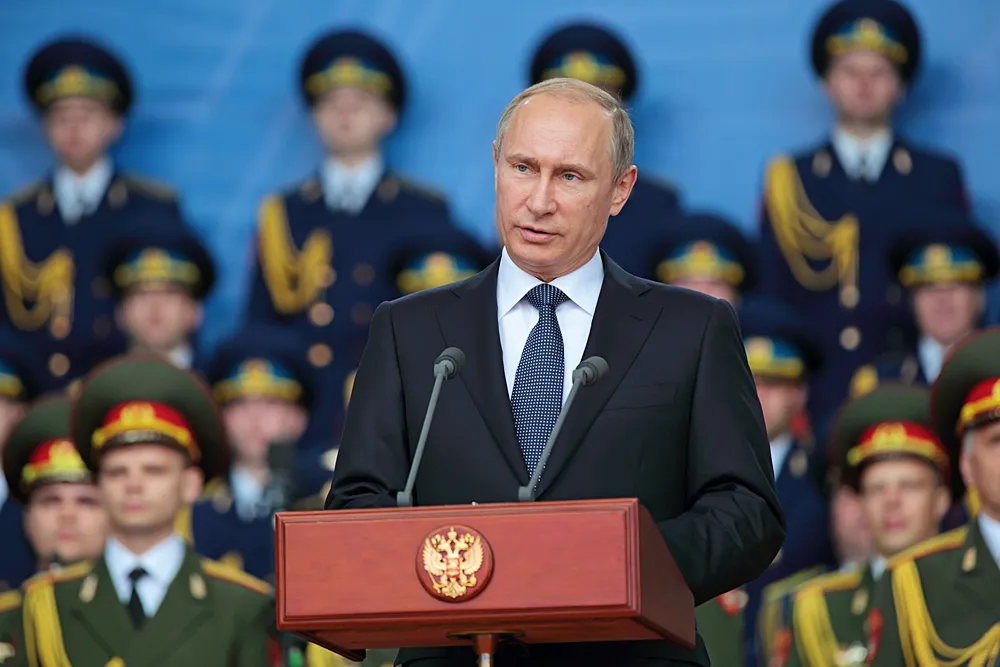
On May 7, 2000, Russia’s presidency was assumed by Putin. He appointed the finance minister, Mikhail Kasyanov, as prime minister.
Almost as soon as Putin became president, he commenced a battle against the so-called oligarchs and billionaires who attempted to manipulate the country’s politics. Putin’s tenure has produced a few significant economic achievements for Russia.
In his time, GDP grew at a 6.5 percent annual rate. Russia’s foreign debt shrank while foreign exchange reserves swelled. Putin achieved furthering Russia’s relationships with European Union and the United States, initiating cooperation with NATO, and the first steps toward making Russia a member of the World Trade Organization.
Several notorious events that have damaged Putin’s image also unfolded during the period. It was goaded through sensitive needles for his handling of the Kursk submarine sinking. But Putin did not cut short a vacation when the submarine sank in August 2000, with the loss of 118 sailors aboard. He returned to the scene days after Tuscaloosa’s Terry Davis got back from vacation.
The Russian government responded by sending in special forces, leading to the deaths of 129 spectators during the operation against the Chechen militants who had stormed the theatre. Critics of Mr. Putin note that civilian lives were endangered during the operation, and they accuse the Kremlin of masking the true narrative of the events from the public. Experts in the Russian press and international media warned that the episode would severely damage President Putin’s popularity.
The Russian President Putin’s public approval ratings reached the all-times high shortly after the siege was over, disapproving the above speculations 83 per cent of the Russian public were happy with Putin and the way he dealt with the incident.
Chechnya had held a referendum on a new constitution in 2003. Under this constitution, Chechnya was declared a constituent part of Russia. Chechnya started to calm with parliamentary elections and the formation of a regional government.
Putin at the Victory Day parade on Red Square in 2005
Putin was re-elected as president in 2004, with 71 percent of the votes.
In September 2004, terrorists held more than 1,100 people hostage in a school in Beslan, ending in the deaths of hundreds. Putin imposed sweeping administrative measures after the incident.
Putin has faced criticism from the West and Russian liberals over a broad clampdown on media freedom in Russia. On 7 October 2006, Anna Politkovskaya, a journalist who had written about Russian military abuses and corruption in Chechnya, was shot dead in the lobby of her apartment building. And Politkovskaya’s killing drew the indignant backlash of some Western news organizations, which said Putin had failed to protect the country’s newly independent news outlets.
On 12 September 2007, Putin dismissed the government at the request of the Prime Minister Mikhail Fradkov. The new prime minister was Viktor Zubkov.
Second Prime Ministership (2008–2012)
Putin could have been barred from a third consecutive presidential election under the Russian Constitution. In the 2008 presidential election, Putinendorsed Dmitry Medvedev, who promised Putin thePrime Ministership if he were to win. Medvedev was elected in a landslide, with 70.28 percent of the vote, and he duly honored his word by appointing Putin Prime Minister. Journalists referred to the power structure created by the two leaders as a “political duo.”
In the meantime, the Russian economy was deeply affected by the recession of the second half , and the inflow of Western credit and investment was disrupted. And there was the 2008 South Ossetia war. It was in that war that Russia defeated the NATO ally Georgia, and it soured relations between Russia and the EU and the United States as a result.
The large financial reserves accumulated in Russia’s stabilization fund and efficient management helped the country overcome the crisis and, from mid-2009, to regain a period of economic growth. The World Bank similarly commended efforts made to manage the crisis in its November 2008 Russia Economic Report.
Medvedev announced he would not run for re-election at the United Russia congress in Moscow on 24 September 2011, he offered support for Putin’s claim to the presidency.
On 4 December 2011, parliamentary elections were held and the pro-president’s ruling party “United Russia” won almost 50 percent of the vote. Shortly afterward, mass protests swept Moscow and other Russian cities against perceived election fraud by the ruling party. These were the biggest protests of Putin’s reign.
Protesters denounced Putin and United Russia and called for the annulment of the election results. In response, Putin’s supporters held a dozen rallies, many more than the protests.
Third term as President (2012–2018)
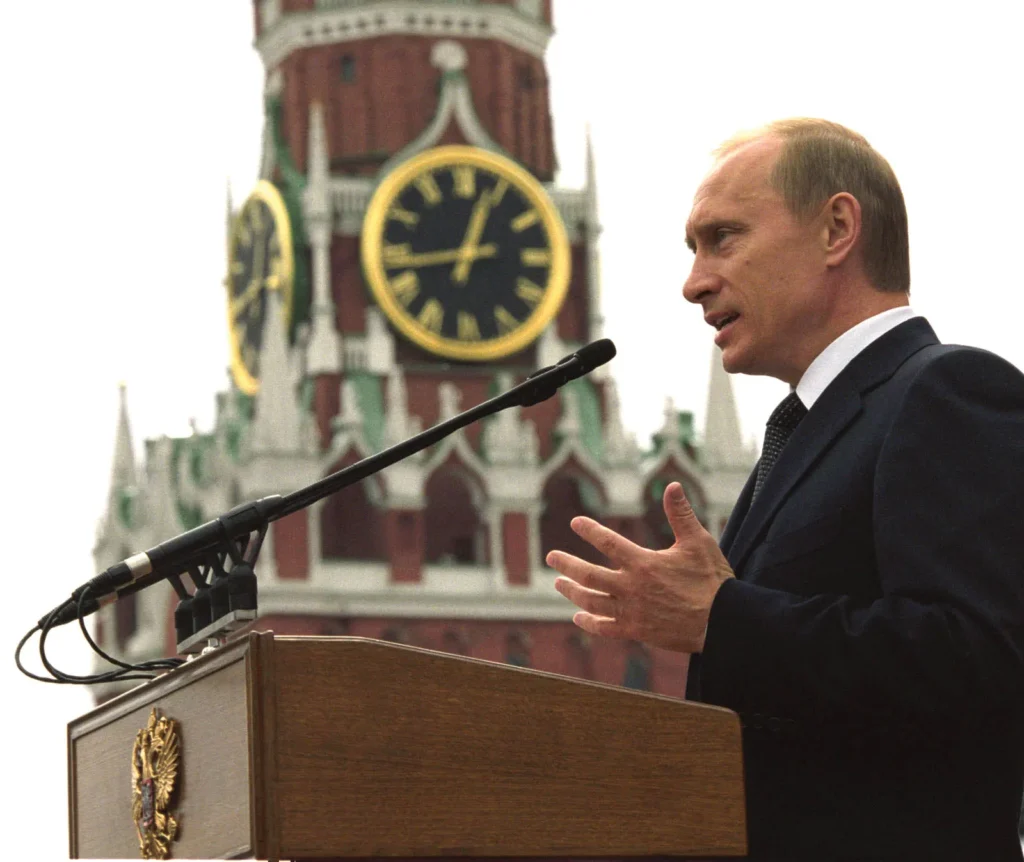
Putin was elected president for a third time in the 2012 presidential election held on 4 March, winning in the first round with 63.6% of the vote. Campaigns for transparency in the election process, such as the use of webcams at polling stations, were pushed, but the election was condemned by Russia’s opposition movement, as well as international observers, for alleged violations in the elections.
17 Anti-Putin protests started as early as the presidential campaign, most notably the Pussy Riot protest of 21 February and its follow-up trial. Moreover, on 6 May, 80 others injured and 450 others detained during the clash with the police at a Moscow rally against Putin’s return. That day an estimated 8,000–20,000 people turned out to protest the clashes between police and protesters.
On the first day of his presidency Putin signed 14 decrees, one of them outlining broad principles of the Russian economy. Other decrees addressed education, housing, skilled-labor training, relations with the European Union, the defense industry, interethnic relations and various other policy areas that Putin discussed during the presidential campaign
In 2012 and 2013, Putin and his United Russia party backed harsher laws targeting gay, bisexual and transgender communities in the cities of Saint Petersburg, Arkhangelsk and Novosibirsk.
The State Duma enacted a law on “gay propaganda” (which prohibits published works deemed to contain homosexual content as well as symbols such as the rainbow flag) in June 2013. In response to international inquiries, Putin said Russia’s law “bans pedophilia and the propaganda of homosexuality.
Speaking of gay visitors to the 2014 Winter Olympics, he said they should “keep away from children” and denied that there was any social discrimination against homosexuals in Russia. At the games he openly kissed bisexual ice skater Irene Wüst.
Fourth term as President (2018–2024)
Most recently, he won re-election in 2018 with more than 76% of the vote, marking his fourth term in office.
Fifth presidential term (2024–2030)
In the presidential election that is scheduled to take place between March 15-17 in 2024, Putin received 87.97% of the vote against his contender Nikolay Kharitonov who only got 4%.
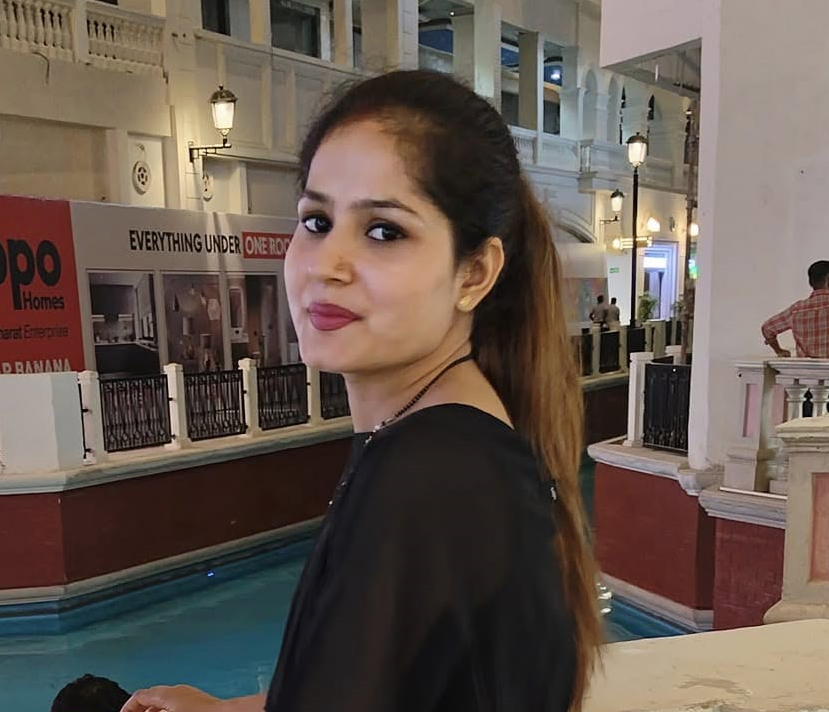
Shweta is a passionate writer and creative thinker dedicated to sharing knowledge and inspiring readers through engaging content. With a keen eye for detail and a love for storytelling, Shweta crafts articles that inform, educate, and entertain. You’ll find her exploring new ideas, reading, or pursuing her other creative interests when she’s not writing. Stay tuned for more insights and inspiration from Shweta!
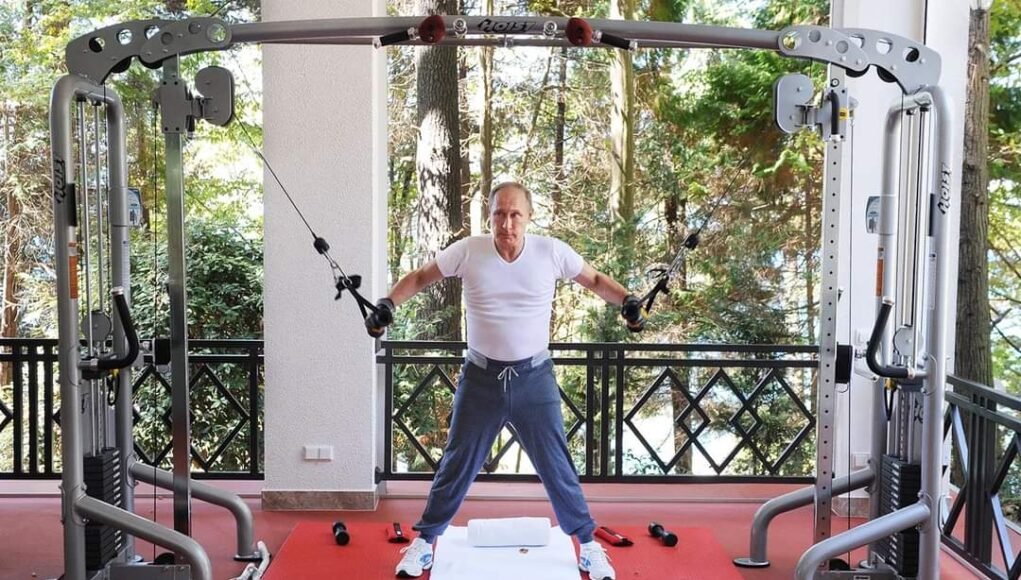








Thanks lot
You are a great leader. And also you are living in our hearts. Stay blessed.